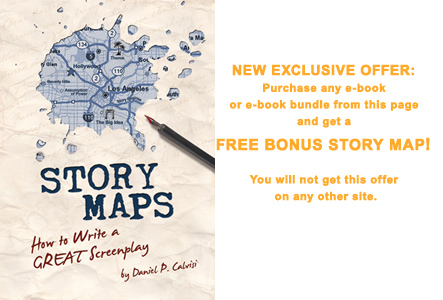Why I don’t do Coverage and why you don’t need it
I don’t offer script coverage as one of my consulting services; I prepare detailed story notes that identify narrative problems and offer specific suggestions on how to fix them. However, I wrote coverage on scripts and books for years as a professional movie studio Reader. So I’m very familiar with it. You will find a number of services online that offer screenplay coverage, but in my opinion it’s not the best thing to spend your money on. Here’s why…
Coverage is an employer-specific evaluation of a screenplay’s potential as a commercial feature film for that particular production company. In short, there’s no way that an independent reader can give you a true coverage report as they’re not reading for a production company/studio employer. There’s so many different markets, audiences, and producers out there that I can only suggest a direction for your script, but I can’t say with absolute certainty how the industry will respond to your material. No one can.
Let’s use a fictional case study as an example. Let’s say you have an action thriller and you submit it to these three production companies: Jerry Bruckheimer Films, Egg Pictures, and Team Downey. Your script will be given to a Reader who gets paid a flat fee to “cover it,” which means they read it and prepare a 3-5 page report that synopsis the plot and includes one page of notes explaining the Reader’s opinion on the commercial and craft potential of your screenplay and an ultimate “grade” of PASS, CONSIDER, or RECOMMEND.
In this example, your script is a strong action script with a nice high-concept story hook, a driving throughline and an unlikely middle-aged female protagonist that reminded you of Jodie Foster’s character in “Panic Room.” There are some fun characters, although there’s not much time to develop the characters as the emphasis is on action set pieces and narrative tension.

The Reader at Jerry Bruckheimer Films takes it very seriously right off the bat, as they make action films and have a very strong track record of success with this genre. So let’s say this Reader gives your script a “Consider,” which is a very good grade, and she offers a few names of female stars that Bruckheimer has relationships with as potential talent for this project. Fantastic.
But the Reader at Egg Pictures, which is Jodie Foster’s company and to date hasn’t produced a straight action movie, knows within the first 5 pages that it’s a pure action thriller and knows this isn’t what Egg is looking for at the moment. Not that it’s completely out of the question that Jodie Foster would star in an action thriller, but this Reader has been specifically told to keep a lookout for character pieces and/or strong character work in another genre. Ultimately, his coverage is a PASS and recommends that although the writing was decent and the writer should be kept in mind for any future action script rewrites, this would only work for them now with some major rewriting — the writer should definitely try scaling down the action and focusing on the characters, especially the relationship between the female protagonist and her young daughter.
The Reader at Team Downey (Robert Downey Jr. and his wife Susan’s production company) also likes the script and gives it a Consider, but only with the stipulation that the protagonist be changed to a younger man, in the age range of 25-32, to boost its chances of being set up at their parent studio of Warner Brothers and also because Robert Downey Jr. is currently looking for an action project to produce and possibly direct for his good buddy Shia LaBeouf.

So where does that leave us? Three coverages, with these three main notes:
- Really good, don’t change a thing, we’re interested
- Emphasize character over action in a page-one (complete overhaul)
rewrite - Rewrite, changing middle-aged female protagonist to a young male
Does that help you? No. These are conflicting reports and you specifically wrote a story that centers on a middle-aged female protagonist and a driving action story spine. That’s why you also wove into the narrative the Controlling Theme of “a mother will go to any length to protect her children.” That’s the idea you’re exploring, and it could easily get lost if the film starred a, um, 28 year-old Hollywood hunk. Besides, none of these readers even mentioned the theme, as their employers hold them to the industry-standard of only a single page in the opinion section and there just wasn’t any space to get into a craft topic like theme.
Are these helpful story notes that guide you as you work on the next draft, the one you hope will sell? No. These are mainly COMMERCIAL assessments based on the interests of the company that was reading them. And they don’t go into any detail with suggestions for how to solve any true story problems. You may get the crucial note to trim Act Two; but trim what, exactly? The heads and tails of scenes? The dialogue, or maybe that stunt at the end of the car chase that isn’t necessary but you know it’s never been done before and it’s an opportunity for a strong character moment? You’ll never know.
Now, let’s say you gave your script to a private consultant for one page of Coverage. They’re not working for an employer. So would they give it the Jerry Bruckheimer assessment or the Jodie Foster assessment or the Robert Downey Jr. assessment? Or maybe they’re more into indie or arthouse films so they’ll give it the Philip Seymour Hoffman assessment? Who knows. But it doesn’t matter because THEY’RE NOT READING FOR A HOLLYWOOD BUYER. So they’re not going into the read with a specific professional purpose. Thus, it’s not true Coverage. And one page isn’t enough to really analyze any story.
So that’s the longwinded explanation of the first major reason why I don’t give Coverage to private screenwriters like yourself. And the second major reason is this…
90% of my clients come to me with a draft that isn’t quite close to being submission-ready. And I’m truly sorry to be the one to say this to you, faithful reader, but…you are probably in this 90%. And that’s no reflection on you or your talent; it probably just means it’s an early draft and this story has not yet realized its full potential on the page (heck, the 15th draft may still be an early draft, if the 20th is where you find the sweet spot and knock it out of the park). Coverage is a part of the submission process, and most of you have more hard work ahead of you before you reach that place. And that’s okay.
A very rare few screenplays come to me just a quick polish away from busting down the door of ICM or Dreamworks, but the majority are more like a page-one rewrite and 3-4 more polish drafts away from the glory of the cover of Variety. Which is fine, fantastic, you’re not alone; every script must go through those difficult early stages and every
script needs to go through many, many drafts before it comes into its own; and it’s my job to provide detailed notes that ideally CUT OUT 2-3 DRAFTS for the writer. My notes will save you a lot of time and perspiration. In other words, you may end up toiling away for 14 months (or 14 years?) on your screenplay before it’s even ready to be submitted to anyone, but if you work with me early on, I’d like to say you would cut that down to, say, 3-4 months (that’s being realistic, assuming you have a full-time day job and other commitments that steal your time). I’m going to give you clear notes grounded in strong, practical principles that I have gleaned from working in the industry for years, reading the work of the consummate pros and coaching and teaching hundreds of writers.
As I read your script I’m going to know from experience where you’re at in your growth as a screenwriter and I’ll be able to give you a comprehensive analysis of your present strengths and weaknesses and point you in the right direction for future improvement.
So that’s why I think you might want to reconsider screenplay coverage.
In closing, I will concede this: paying for coverage might be helpful if you’ve already gone through a consultant or two, given your script to 4-5 knowledgeable friends and incorporated their notes into a comprehensive rewrite, and written AT LEAST 3 drafts of your screenplay. And I’d also say pitching it to a few agents and creative executives would be in your best interest, as well. THEN you can pay for coverage and might find it helpful, as a general assessment of your screenplay. But in my experience most writers aren’t yet to that level, whether out of being new to the process or just not having enough free time to devote to their screenplay; they could use some direct, honest and detailed analysis of their work with helpful suggestions for changes.
Good luck and happy writing!
Dan Calvisi
Related: My Screenplay Consultation Services
Related: The Story Maps Master Class: Write, Rewrite, Submit
“A brilliant example of what every aspiring screenwriter needs to know about the art of writing screenplays. A must read for serious screenwriters.”
-J. Stephen Maunder, writer/director



Thanks for the fast reply, Dan!
I’m not sure I would qualify for your Master Class but I may get your screenplay notes and then go from there. I assume I could use that script as the writing sample the Master class requires should you feel I qualify?
I’ve signed up for the newsletter. Thanks for the link.
You’ll be hearing from me next week.
-- Tammy
I have an action/adventure script that received a Consider and a Recommend from the Scriptwriters Network Hollywood Outreach program which then made it to their next level. I’ve since incorporated their comments and really don’t quite know what to do from here. I have no way of getting it into the hands of the companies who might be interested as they just don’t take unsolicited scripts. Might you have any advice?
Thanks!
Hi Tammy,
Thank you for your comment and question. I know what you’re going through. It’s difficult to get your unrepped (“unsolicited”) script in the door, but not impossible.
The first thing I would suggest is to try to find a Manager. Mgmt. companies are generally more receptive to accepting submissions, if they like the logline and the writer. I suggest you workshop your logline and one-sheet with friends — really get it humming — then cold call management firms and do your best to get someone on the line who will listen to your pitch. It’s tough, but it can be done. I’ve done it several times, for myself and for clients.
Beyond that, I would also recommend my Story Maps Master Class, which will expose your work to professionals on the management, agency and production sides of the business. I bring in current industry advisors to give notes on loglines, pitches and more. In the Master Class program, you will get notes from me, your peers AND these professionals. I don’t know of any other course that gives a writer that much feedback.
I’m now accepting submissions for the next Master Class. Please sign up for my newsletter and I will be sending out more info soon.
Good luck and happy writing,
Dan
Just today I was told to get some screenplay coverage. Now I’m not so sure. I know my screenplays need a lot of work. Just don’t know if I’ll ever have the perfect draft.
i have been working extremly hard on my script, constantly editing it, but i’m doing it all alone and no one wants to read it (at least not for free), so bascially i’m writing blind, i dont know if i’m progressing or what. so what should i do?
Hi Marcus,
I emailed you a reply so look for it. Do NOT write totally in a vacuum, you must get feedback from others at some point or you’ll never progress, as you said.
In general, depending on where you’re at with your screenwriting craft and career, I can help you out with some sort of notes, coaching or class, so please look around my site, most notably the My Script Services and Classes pages. I’m also launching a new group class soon, taught by email so you can do it from the comfort of your home on your own schedule. See Group Online Story Map Workshops. Good luck and happy writing!
-Dan
Dear Mr. Calvisi:
I am just checking around, I have a screenplay that was in a manager’s hands for a year to help with a re-write, the writer never came through, so we re-wrote it, he had a production company who wanted and now we are getting jacked around…. Don’t want top give up, but need help finding a competent manager….
hi Shanan,
I will email you in regards to your script. I can help you improve the script, either by rewriting it myself (Script Doctoring) or giving you detailed notes geared toward strengthening every major area to blow away readers like me. In some cases, if I think a script is close enough to being submission-ready, I will refer a client to a rep, producer or fellow screenwriter but I don’t guarantee it and I don’t sell that service. As it should be, it’s a networking courtesy that can only help me or any other writer out. There’s ultimately no competition amongst screenwriters, IMHO; we need to all help each other out because if your friend/acquaintance breaks in they will be in a better position to help you break in. But, bottom line, your work needs to be at a certain level to inspire anyone to give you a referral to their hard-won contacts.
It sounds like you took the risk of letting a rep “hip-pocket” your script while you did rewrites on spec with their notes; this can work out, in some cases, but most of the time it ends up tying up your script in limbo and maybe even killing it in the marketplace (or killing it for a while). It depends on if the Manager pitched it or submitted an earlier draft and to whom. I’ll shoot you an email and maybe I can help you out.